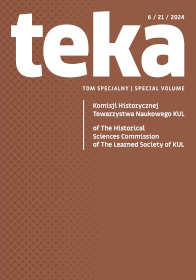Religious Justification of the King’s Authority in Polish Political Thought in the Second Half of the 18th Century
Religious Justification of the King’s Authority in Polish Political Thought in the Second Half of the 18th Century
Author(s): Arkadiusz M. StasiakSubject(s): History, Modern Age, 18th Century
Published by: Towarzystwo Naukowe Katolickiego Uniwersytetu Lubelskiego Jana Pawła II
Keywords: charisma of power; mission; theory of power; Enlightenment thought; Polish political thought
Summary/Abstract: The Polish monarchists presented a providence-based interpretation of the abduction of the king in November 1771 and his rescue. The trust in the authority of Providence, the manifestation of which was that the monarch guaranteed order in the state. Thanks to continuous confirmation of the royal anointing, the transfer of the relationship between God and the guarantor of the world order, and the relationship between the monarch and the guarantor of the state order might have been achieved. Such a perception of the anointing must have inspired great trust in the actions of Stanisław August.The process of sacralization of royal power was stopped by the expansion of Enlightenment rationalism. Polish theorists of state did not always follow the path of challenging the divine origin of power, which was set by Western European philosophers. In Polish political thought the idea of charisma was very rare, which does not condition its negation. We may venture a claim that in the period extending from Stanisław Konarski’s late works until the first works of Stanisław Staszic the idea of charisma as a feature of royal authority disappeared from the Polish political theory and reflections on the authority.
Journal: Teka Komisji Historycznej Towarzystwa Naukowego KUL
- Issue Year: 21/2024
- Issue No: Special
- Page Range: 115-130
- Page Count: 16
- Language: English

